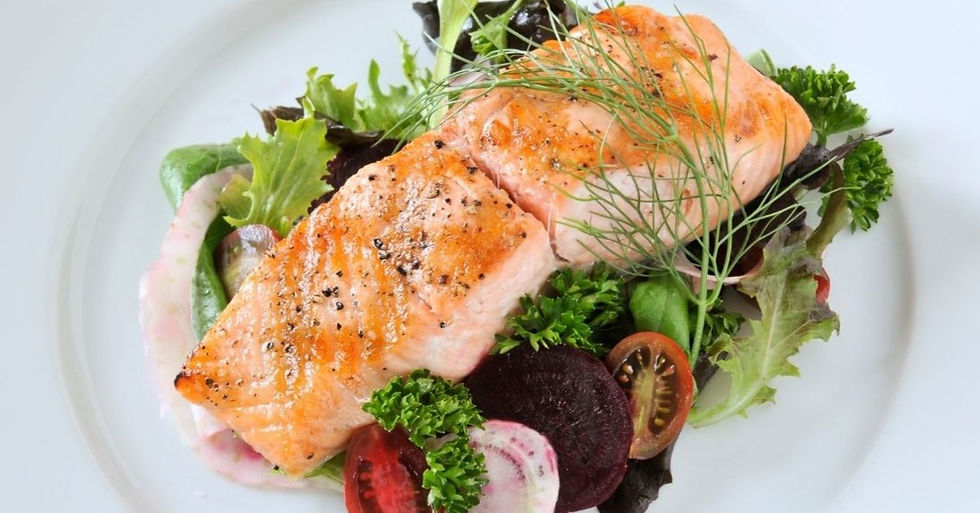Eating for energy levels
- Vicki Witt
- Apr 27, 2022
- 4 min read
Updated: Nov 9, 2022
If you lack energy and are exhausted all the time you may be wondering what you can do. One thing to consider is the foods you are eating. Let’s take a look at how the foods you eat can affect your energy levels.

How your diet affects your energy levels
Food provides energy for your body. Some foods can cause quick energy bursts, but these often lead to a rebound effect of energy drain. Many foods contribute to increased cortisol levels. The increase in your body’s stress reaction from the cortisol increases will drain your energy. On the other hand, foods which are slower digesting or have slower digesting carbohydrates can help to keep energy levels balanced. If you are low in some nutrients that can affect your energy levels.
Inflammation can also contribute to fatigue so foods that increase inflammation should be avoided. Foods that contain omega 3 fatty acids, magnesium and zinc help to reduce inflammation.
Nutrient deficiencies can also contribute to fatigue. Diets low in iron, vitamin B-12 or vitamin D can contribute to feelings of weakness and fatigue.
Foods that contribute to fat storage can also cause you to feel sluggish.
Other ways that foods can help with energy levels are by helping with immunity, mood and hormone balance.
Let’s take a look at some foods more closely.
What foods increase energy levels?
Salmon
Fatty fish like salmon contains protein which is slower digesting for more sustained energy. Salmon also contains omega-3 fatty acids which can improve brain function and reduce inflammation. Salmon also contains immunity boosting vitamin D.
Nuts
Nuts are high in fat and calories so are often limited when trying to lose weight. But nuts are slow digesting, contain healthy omega 3 fatty acids and magnesium. The omega 3’s help to reduce inflammation. It’s important to watch the portion size when consuming nuts. A little goes a long way.
Eggs
Eggs provide protein and fats which help to provide longer lasting energy. They contain all the essential amino acids and have a combination of vitamins and minerals that help with fat burning. That’s what makes eggs a good choice for breakfast instead of processed carbohydrates. They are also one of the few food sources of vitamin D.
Legumes
Legumes like beans and lentils provide slow digesting carbohydrates for longer lasting energy. They are high in fiber which helps to keep blood sugar levels more stable. They are also high in nutrients like iron, magnesium and zinc.
Water
Dehydration can lead to fatigue, so you can improve your energy levels by staying hydrated.
Leafy greens
Leafy green vegetables are rich in nutrients that help to improve energy levels. Leafy green vegetables also have a high water content so they help to limit fatigue causing dehydration. Leafy greens are also important for liver health.
Beef
Lean cuts of grass fed, pasture raised beef can play an important role in maintaining energy levels. Proteins are slower digesting foods than carbohydrates and the iron content of beef can improve energy levels if you’re not getting enough iron. Beef is also a source of vitamin B12.
What foods drain your energy
Many foods which give a quick energy burst cause a dip in energy after. Foods to avoid when you are trying to maintain steady levels of energy are:
Sugary foods and drinks
Sugary foods boost blood sugar and energy for a short time. But this blood sugar boost is usually followed by a drop in blood sugar and a crash in energy levels. They also contribute to inflammation and take the place of healthier energy boosting foods when included in your diet. They also contribute to fat storage making them a poor choice when you want to boost energy.
Processed carbohydrates like white bread or baked goods
Processed carbohydrates are similar to sugar containing foods in their contribution to inflammation and blood sugar spikes. They also contribute to fat storage and have little nutritional value so they can take the place of energy boosting foods in your diet.
High caffeine foods and drinks
Drinks like coffee and tea can provide an energy boost because of the caffeine content, but too much can make you feel jittery and anxious. This can contribute to higher cortisol levels and fat storage and leave you feeling more fatigued.
Other things to consider
If you are sensitive to any foods, the reaction your body has to eating these will drain your energy. So if you feel tired and sluggish every time you drink milk you might want to get tested for an intolerance.
Not eating enough can drain your energy. Which can mean that you don’t have the energy to exercise or just generally be active. With the right eating plan you can lose weight and improve energy levels.
Summary
Eating the right foods and the correct balance of Protein, carbs, and fat at each meal and snack will ensure you tap into body fat for energy. Win win - lose fat and gain the well spring of energy. If you are not an existing patient and would like to know your specific food prescription to optimize your body and fat loss, book a free nutrition assessment.
Warm wishes,

Vicki Witt | Clinical Nutritionist | Holistic Coach | Reiki Master | Certified LEAP allergy therapist Over 25 years of successfully helping you achieve optimal health and weight loss 🍏 | www.vickiwittweightloss.com
Certified and Registered Nutritionist
About Vicki:
Vicki Witt is a Clinical Nutritionist, Holistic Health Coach, and Reiki Master. She has been practicing over 25 years and specializes in holistically customizing diet and lifestyle plans to each individual for weight loss and hormonal control. Her clientele often report they feel the best they have ever felt and wish they had started sooner. One of the USA and Australia's top Nutritionists, she has won multiple awards for her services in the industry.






Comments